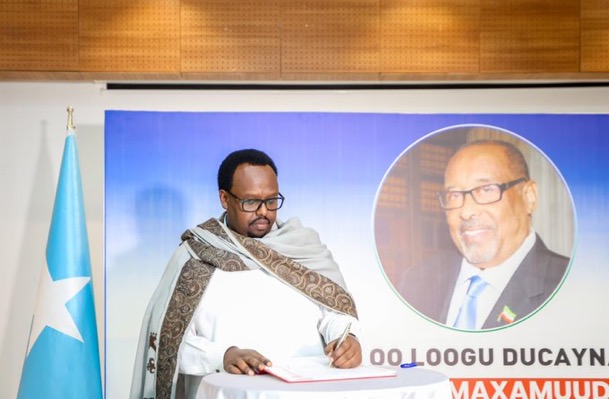Mogadishu, (SONNA) – The Deputy Prime Minister of the Federal Government of Somalia, H.E Salah Ahmed Jama participated in an event to pray for the late President of Somalia’s northern region (Somaliland) Ahmed Mohamed Mohamud ‘Silanyo’ together with senior politicians in Mogadishu and discussed a brief history of the deceased.
“I extend my heartfelt gratitude to everyone who joined us this evening to pay their respects to the late former President of Somaliland, His Excellency Ahmed Mohamed Mohamoud “Silanyo“ who passed away last Friday in Hargeisa”Deputy PM said.
His legacy of over 60 years in public service is deeply intertwined with the history of the Somali state, from the democratic and dictatorship eras to the post-conflict era. His trials and tribulations are living examples of the Somali people’s grappling and experimentation with the very idea of statehood, nation-building, and politics.
His commitment to governance and development is evident in the diverse and impactful positions he held throughout his illustrious career. As a minister between 1965 and 1982, he played a pivotal role in shaping Somalia’s policies and strategies significantly contributing to the nascent Somali state’s efforts to improve the conditions of its citizens.
Navigating the contours of the post-colonial African state, he found himself fluctuating between being in the government and leading the Somali National Movement, opposing the military dictatorship for six years between 1984 and 1990.
In Somaliland, before becoming a president, he played a constructive role as the leader of the largest opposition party.
As a President of Somaliland, Silanyo spearheaded transformative initiatives, including significant infrastructure projects such as developing the Berbera Port and the Burao-Erigavo corridor. His leadership left an indelible mark on Somaliland’s progress and stability.
One of his most memorable legacies, however, is his exemplary acceptance of the results of the 2003 Somaliland presidential election; he gracefully conceded to incumbent President Dahir Rayale Kahin, who won by a margin of just 80 votes—a testament to his respect for democracy and commitment to peace. I am sure the historic decision he made that day has and will continue to shape Somaliland’s political culture and democratic practices, including the last one taken by the outgoing President Muse Bihi.
Finally, as one of the last towering figures of Somali politics, he will be remembered for his bold decision to engage in talks with the Federal Government of Somalia in 2012, which ought to inspire and set a precedence for the continuation of this dialogue that could potentially culminate into the attainment of unity.
May Allah (SWT) bless his soul. Once again, my condolences to his family, the people of Somaliland, and the Somali people at large.





